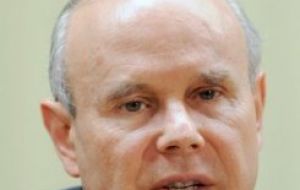MercoPress. South Atlantic News Agency
Rousseff’s Brazil expected to restrain public spending and lower interest rates
 Mantega is optimistic that BNDES subsidized financing can be curbed
Mantega is optimistic that BNDES subsidized financing can be curbed Brazilian President-elect Dilma Rousseff efforts to restrain public spending will allow the central bank to cut the benchmark interest rate next year, Finance Minister Guido Mantega said.
“I believe the central bank can cut in 2011” Mantega said in an interview as he was leaving Seoul after the Group of 20 Summit. “We are going to create conditions to open a space for the interest rate to fall. How much it will fall, I don’t know, but I can assure you it will fall.”
However in spite of Mantega’s statements market operators believe the incoming government will be required to resume interest-rate increases early next year, as domestic demand fuels inflation, which has exceeded the country’s 4.5% annual target in the past two months.
Mantega said Rousseff, who takes office Jan. 1, will seek a balanced budget by the end of her term in 2014 while reducing net debt to about 30% of GDP from 41% now. The next government will have room to curb federal expenditures and trim subsidies to the state development bank given the economic expansion is no longer dependent on the state playing a “more active role,” he said.
Brazil’s budget deficit narrowed to a 21-month low in September, after the government sold oil rights to state-controlled producer Petrobras in exchange for new stock, boosting federal revenue.
The budget gap narrowed to 2.36% of GDP in the 12 months through September, the lowest since December 2008 when it was 1.9%, according to central bank figures. The deficit had widened to 4.5% in October 2009 after the government cut taxes and stepped up public investment to boost economic growth amid the global credit crunch.
Since 2009, the government has injected 205 billion Real (119 billion US dollars) into its Rio de Janeiro-based state development bank, BNDES. The BNDES, which provides companies loans at interest rates below the country’s overnight rate, lent 170.8 billion Real in the 12 months through October, a 33% jump over the same year ago period, according the bank’s website.
That’s tops the 72.2 billion US dollars the World Bank lent globally in the fiscal year ended June 30.
“The subsidy will be reduced,” Mantega said. “We are going to create conditions for the private sector to be able to provide the kind of long-term financing that the BNDES does.”
The central bank kept its benchmark interest rate unchanged at 10.75% in its two past meetings, after raising it by 200 basis points from a record low 8.75% earlier this year.
Policy makers led by Central Bank President Henrique Meirelles forecast inflation will slow to 4.6% next year without any further rate increases, according to a Sept. 30 inflation report.
Consumer prices rose more than forecast in October, driving inflation to an eight-month high. Prices as measured by the benchmark IPCA index rose 0.75% in October, pushing the annual rate to 5.2%, the national statistics agency said Nov. 9.
Lower interest rates will help weaken the exchange rate, Mantega said. The recent strength of the Ral has hit the country’s manufacturers, causing industrial output to lag behind retail sales over the last five months.
“This is why the exchange rate is important to us, it artificially cheapens foreign manufactured goods, which come and compete with Brazil’s manufactured goods,” Mantega said. “This is a problem that will be tackled by the next government.” Industrial production contracted 0.2% in September from August, the fifth monthly decline in six months.




Top Comments
Disclaimer & comment rulesCommenting for this story is now closed.
If you have a Facebook account, become a fan and comment on our Facebook Page!